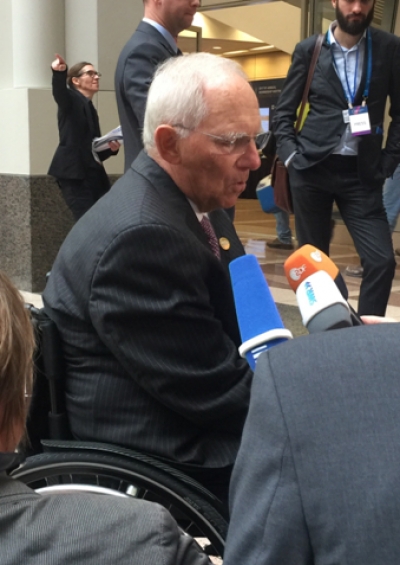Wolfgang Schäuble: Unwavering European
To manage Europe’s future, the outgoing German finance minister argues “First comes risk reduction — and only then risk sharing.”
October 24, 2017

Earlier this month, German finance minister Wolfgang Schäuble (pronounced SHOY-bleh) made the rounds in Washington, bidding farewell to friends and interlocutors in the global financial community.
After eight years in his post at the Finance Ministry, the 75-year-old Schäuble today shifts his assignments, to become the speaker of the German parliament, the Bundestag.
Schäuble will remain influential in German politics, but his absence from European economic and financial deliberations creates a significant void. Schäuble has been a dominant voice within the 18-nation Eurozone, where he is credited with steering the common currency through the turbulence that followed the 2008 global crisis.
Resolute in safeguarding the euro and maintaining monetary union, Schäuble insisted that crisis ridden peripheral countries—Ireland, Spain, Portugal and Greece—bring order to their finances and stick to the tough rules that govern euro membership.
Overcoming adversity
For 27 years, ever since he was shot at a campaign rally by a would-be assassin, Schäuble has been confined to a wheelchair, paralyzed from the waist down. Lesser men would have retreated to the sidelines, but Schäuble carried on, resuming his duties as interior minister and then becoming finance minister 2009.
A lawyer by training, not an economist, Schäuble was a top advisor to Chancellor Helmut Kohl and played a lead role in negotiating the merger of the two Germanys in 1990.

Schäuble speaking to reporters, October 12, 2017. Photo by Barry Wood
Reflecting on his career at the annual meeting of the Institute of International Finance, Schäuble said Europe and the Eurozone are doing fine. “In my lifetime,” he said, there have never been better times.”
He said globalization has produced huge benefits easily seen at any supermarket or department store. But he emphasized that globalization is hard to explain to citizens and that doing so is an essential challenge for politicians everywhere.
The Brexit challenge
Concerning Brexit, Schäuble said the negotiating parties must be realistic. “It (Brexit) can’t make things better. The challenge is to minimize the damage.”
For Germany, he said, “multilateralism is the only sensible way forward.” He is delighted Germany’s leading politicians favor a strong European Union and “it is fantastic” that France elected pro-EU Emmanuel Macron as president.
As for himself, he said “I never ask first what is best for Germany, I ask first what is best for Europe.” That said, Schäuble favors a modest step-by-step approach.
“Governments must stick to the legal basis of the European Union” with national parliaments remaining central. Absent essential advances like full banking union and unified deposit insurance, there will be no German endorsement of Macron’s call for an EU finance ministry.
“Sequencing is critical,” he says. “First comes risk reduction — and only then risk sharing.”
Schäuble says the EU is doing well and in better shape than in 2007. The EU has held together with no other country choosing to follow Britain to the exit.
Takeaways
Earlier this month, Wolfgang Schäuble made the rounds in Washington, bidding farewell to friends in the global financial community.
Schäuble will remain influential in German politics, but his absence from European economic deliberations creates a significant void.
Schäuble was a top advisor to Chancellor Helmut Kohl and played a lead role in negotiating the merger of the two Germanys in 1990.
Schäuble says the EU is doing well and in better shape than in 2007. It has held together with no country following Britain to the exit.
